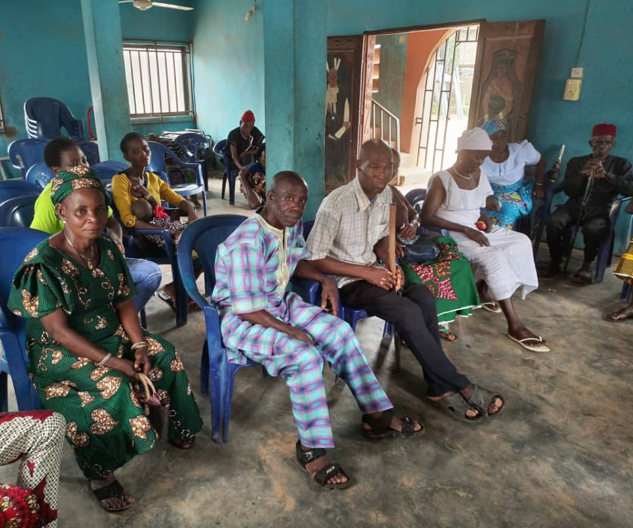The UNICEF estimates that at least 729,000 people were affected and 526,000 displaced in Anambra State, following last year’s flooding. In Anambra West and Ogbaru towns where farmlands and houses were completely submerged, the Latter-day Saint Charities–an arm of the Church of Jesus Christ of Latter-day Saints, partnered with the Catholic Relief Services, a humanitarian agency to provide relief for poor and vulnerable households.
Onyia Benjamin, a farmer in the Umudora Anam community in Anambra West, was the first victim. The flood started from his four hectares of farmland and destroyed over 1,200 Yam Tubers, Maize and Cassava.
“It was in September 2022, I could not recover anything,” he said. “Back at his home, water entered into my living room forcing me to move some property to an upstairs apartment owned by my landlord,”.
“Some foodstuffs and other properties that I could not move quickly were swept away by the gushing floods,” Benjamin further explained. “Me and my family stayed in our landlord’s apartment for two months until the flood receded,”.
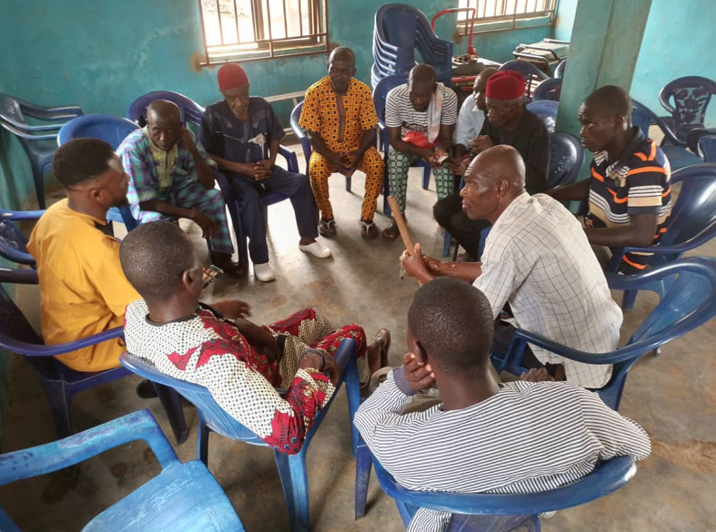
Validation of Selected Beneficiaries in Anambra West. (Credit: Christianaedith Oyahagha)
The Nigerian Minister of Humanitarian Affairs, Disaster Management and Social Development, Sadiya Umar Farouq, said that last year’s flooding cost Nigeria between $3.79 billion to $9.12 billion in total direct economic damages.
Anambra West and Ogbaru are along the banks of the river Niger. While Anambra West is surrounded by both River Niger and the Omambala River, Ogbaru is located along the banks of the River Niger and each time these Rivers overflow their banks, they are emptied into the communities, leading to the destruction of livelihoods.
The Nigerian government claims it approved national emergency flood preparedness and response plans to mitigate and reduce the impact of floods, with relief materials reaching at least 315,000 displaced persons across the country. However, Benjamin and other community residents say they did not benefit from it.
“Sometimes, me and my family went without food and had to depend on help from friends and family members to survive,” he said. “I stayed up some nights, thinking of all that I had lost and how to recover,”.
“This February, I was in my house, after the flood had receded when a group of people from the Justice Development and Peace Commission of the Archdiocese of Onitsha came and said they wanted to register me for a project that is intended to reduce the impact of flooding on impoverished and vulnerable communities,”. I did not pay attention to them because I have written my name severally for help and nothing happened,”.
Funded by Latter-day Saint Charities (LDS Charities), an arm of the Church of Jesus Christ of Latter-day Saints’ efforts to provide succour for families of all nationalities and religions and offer hope for millions of people around the world, the project involved a two-tranche unrestricted cash transfer and a one-time non-food item (NFI)assistance.
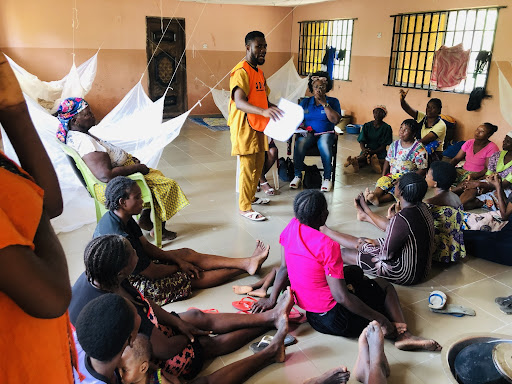
JDPC Project officer, Nwekeagu Shadrach addressing at IDPs Ogbaru LGA Secretariat
The implementation was led by CRS, the nonprofit does not work directly with communities, but partners with nonprofit organizations to provide humanitarian assistance to people in need. Anselm Nwoke, the organization’s partnership and capacity-strengthening coordinator in Nigeria, said that the assistance came after the Archdiocese of Onitsha requested support to respond to the flood victims in Anambra.
In the state, 4 communities in Anambra West and Ogbaru were selected to benefit from the project, including Umudora and Umuikwu Anam, Ossomala and Umunankwo respectively. While about 700 households were captured during the registration, 350 were selected, including Benjamin’s family.
“After they convinced me, I gave my details and they took my picture and two weeks later, I was told that I had been selected to receive the financial support, “Benjamin said. “I went and saw my name and could not believe it because I thought it was one of the numerous scams,”.
An account was opened for Benjamin and two weeks later, he received the first tranche of payment and subsequently, received the remaining two tranches. “With the money and bought food for my family, buckets and other households’ items that the flood had washed away,” he said.
To select the beneficiaries, Anselm said that the NGO worked with the communities and church partners, to develop vulnerability criteria, including female-headed households, pregnant and lactating mothers and very elderly people among others.
Okoye Emeka, a staff of JDPC who worked as an enumerator for the project said that the registration process involved house-to-house visits where data was collected after which final selections were made, noting that many community members were repulsive because they thought it was one of those government scams.
He explained that flooding was particularly worrying because it further worsened the situation of many households who were still recovering from the flooding of 2012. At least 76 people who were trying to escape from the flooding died after their boat capsized in Ogbaru.
“After 2012, we have consistently experienced flooding that only impacts farmlands but not houses,”. Sadly, the government hardly comes to the rescue of affected households, they always come to collect names but never come back,”. “Even the roads that were destroyed, it was the villagers who came together to fix them,”.
A proof that the church cares
Director of JDPC at the Archdiocese of Onitsha, Rev. Fr. Edwin Udoye said that the flood assistance project gave the Catholic church a facelift by changing the perception that the church was only concerned about asking for money and not the welfare of the people.
“The church shared in their pains, there was no segregation in the selection process, both traditionalists and members of other denominations benefitted,”. “They felt the presence of the church in their midst”.
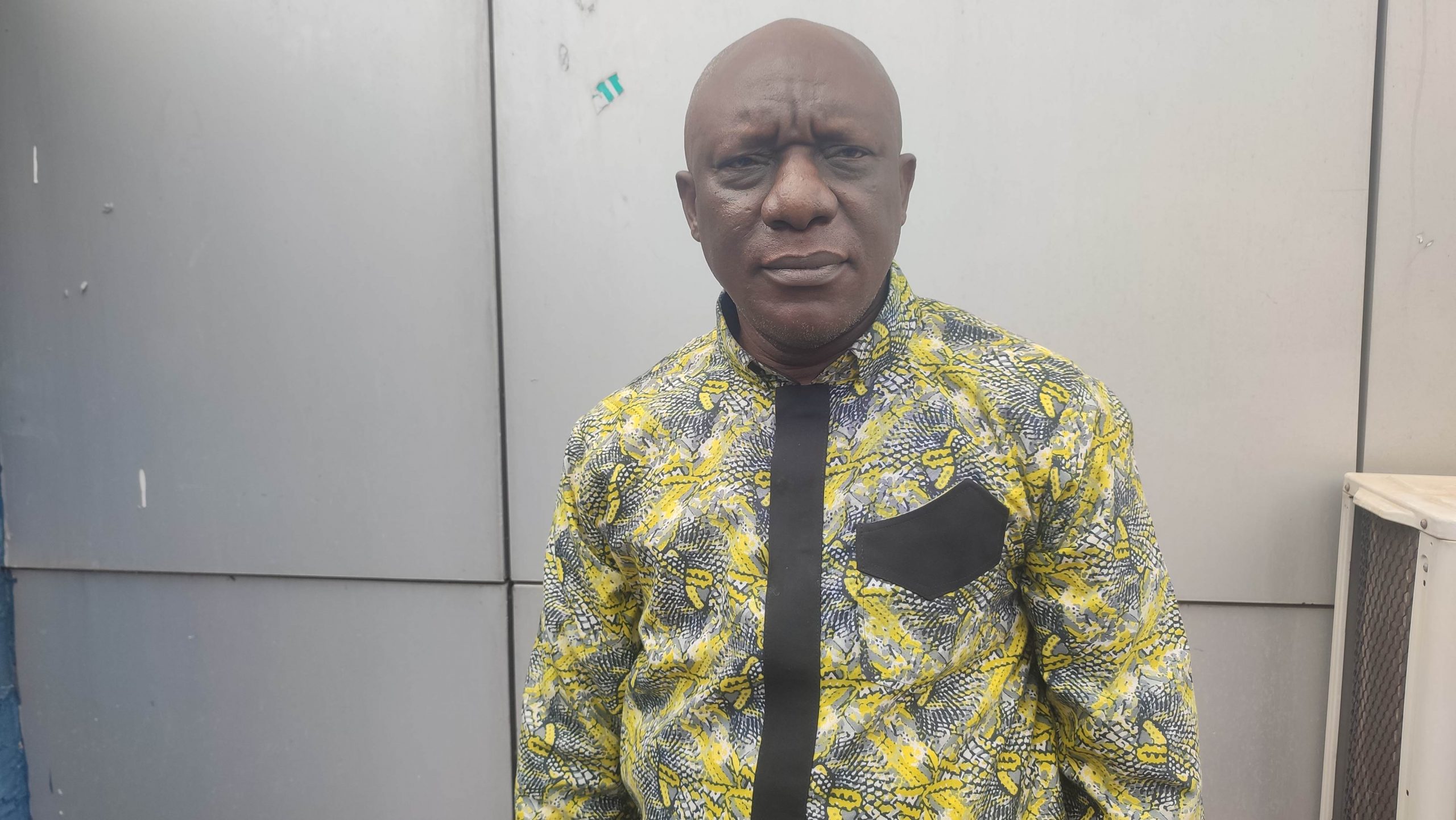
Director of JDPC at the Archdiocese of Onitsha, Rev. Fr. Edwin Udoye
He noted that the CRS had provided initial funding support to the Archdiocese for immediate intervention during the flooding, part of which was used to procure food items for victims and Cassava stems to enable the people to go back to their farms.
“Some of those whose houses were destroyed fixed them with the money, some of them also invested it back into their small businesses. “An estimated 4019 individuals from the 350 households have been touched through the emergency assistance project,”.
Hunger reduced
As the flood worsened, the woman leader of Ossomala community, Chukudifu Mercy took in over 15 households who lived in her upstairs apartment. Sometimes, they contributed money to buy foodstuffs.
“Severally, we ate without oil because the community markets were washed away by the floods and it takes 30 minutes on a normal boat and 15 minutes on a speed boat to get to the nearest market which usually opens every four days,” she explained.
“We were paying between N500 and 1000 to get there, people were sleeping, cooking and also selling inside the boat, “said Mercy who harvested her Cassava, albeit prematurely before the floods came and prepared it for any eventualities.
She however said that most members of her community cannot contain their joy as the assistance has given them reasons to live again and return to their farms. She said it grossly reduced hunger as households bought food that will sustain them before they start harvesting this year.
“Some households lost both the seedlings they stored in their houses, hoping to replant and those they are yet to harvest were destroyed, “she said. “They were not anticipating the flood”.
Project officer for JDPC Onitsha Archdiocese, Nwekeagu Shadrach said that the flood assistance project came when the people needed it the most and brought back lost hope.
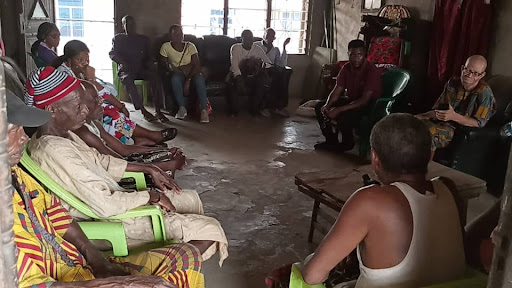
Stakeholders’ engagement at Umuikwu and Umudora Anam Community in Anambra West
“The flooding and its attendant consequences had psychological effects on the people who wondered how they would survive and where the next meal will come from,” he said. “It did not look like help was coming from anywhere,”.
A community leader in Umuikwu Anam, Alfred Edozuno said that he had never seen such a promise made and kept since he was born, adding that it came at a time when members of his community had given up hope of receiving help from anywhere.
“The assistance has further proven to him that God exists and that he cares for his children through the church,” he said. “It has also shown me that the church does not only preach love but also practice it,” They wiped away the tears from our eyes because what happened to my community was indescribable,”.
“I lost my farmland and house to the floods and could not also harvest my Cassava and Yam Tubers, they became food for fishes in the water,” he explained. “When the JDPC team came, I did not want to attend to them because several people have come to my community to collect names of residents with promises to provide relief materials,”.
Edozuno said that the money helped to put food on his table because it was difficult to feed his family after the flood. With the money he received, he bought buckets and other household property that were carried away. He is also back on the farm again, having used part of the money to buy Cassava and Potatoes for replanting.
